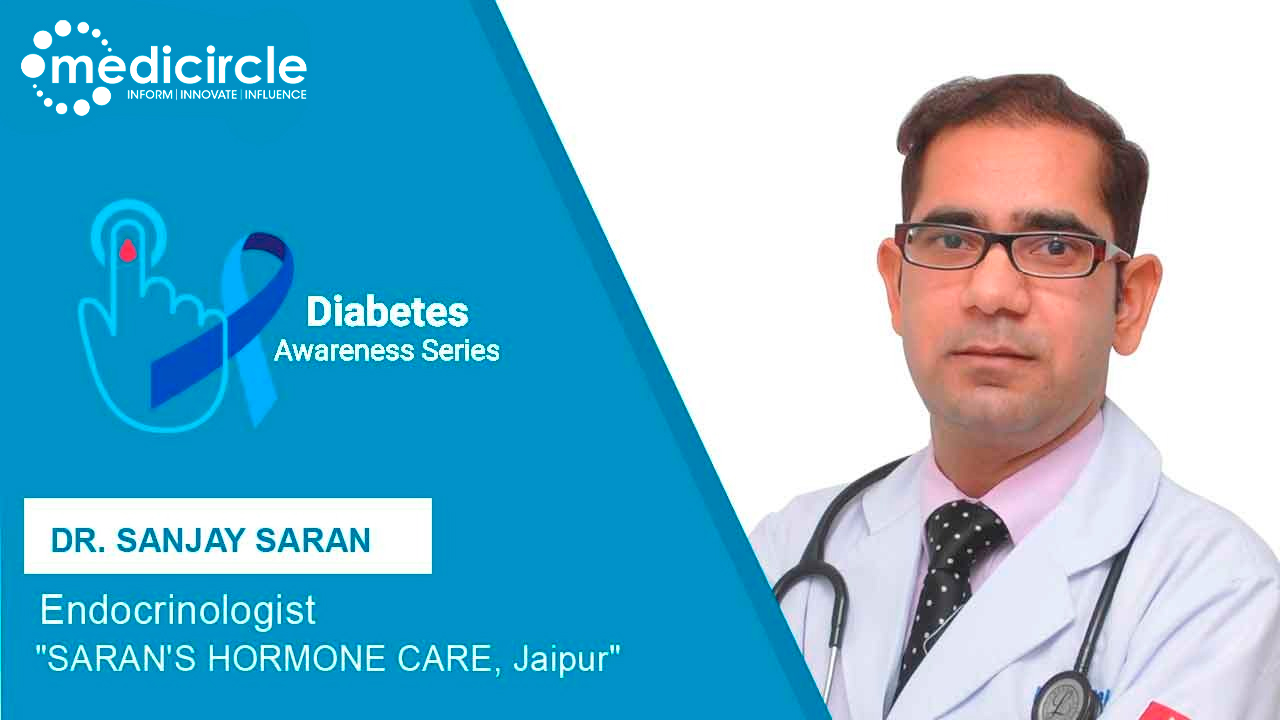Dr. Sanjay Saran is an Endocrinologist in Jaipur, Rajasthan having 15 years of experience in this field. His special areas of interest are Diabetes mellitus, Thyroid disease, PCOD, Obesity, Hirsutism, Growth and Development, Sex-related Problems, Type 1 diabetes, Disorder of Puberty and Reproductive endocrinology. He is currently practising in Saran's Hormone Clinic in Jaipur.
Treatment for Diabetes
Dr Saran begins, “As we can see diabetes is a very common disease in today’s time. There are approximately 80 million cases of type 2 diabetes in India and a few cases of type 2 diabetes. The numbers are increasing fast due to changes in our lifestyle and eating habits.”
“When it comes to treatments we should start with diet and lifestyle modifications. With diet, we should aim to control our weight. Try and take more salads and fruits. These foods are low in calories and are loaded with nutrients. Like multi-vitamins, multi-minerals, fibres and antioxidants. This will not only decrease your weight but will also cause your appetite to decrease. The less hungry you’ll be, the more you’ll lose weight.”
“The next important thing is to know what to eat and what not to eat. We must avoid simple sugar. Simple sugar means sugar, honey, jaggery, or sweet dishes. All these should be avoided. One can consume fruits though. Mango, bananas, Papaya and chikoo, grapes, etc can be consumed. One can have 100 grams at a time and can repeat this 4 times a day. Apples, pears on the other hand can be consumed in any quantity throughout the day.”
“Many people think that rice shouldn't be eaten. That’s wrong. One can eat rice as the glycemic index of rice is less than the glycemic index of wheat. So your blood sugar wouldn’t increase as quickly as it would if you had a chapati. In diabetes, there are not many major no-nos. We even allow diabetes patients to have 15 grams of sugar a day. This also depends upon the blood sugar status of the person.”
“Then there is exercise. One must perform at least half an hour of exercise daily. One can do a brisk walk or play badminton, tennis or swim. People with more weight should perform more exercises that last for an hour or longer.”
“Diabetes treatment is individualised. Meaning it is different for everyone. There are many different medications that are used to solve diabetes. Some are oral tablets and some are injectable. Then there is also insulin. When insulin is low, we suffer from diabetes. So if one injects insulin, we can treat diabetes. But many diabetic Indians don’t want to take inulin and hence we prescribe tablets. Insulin is the best treatment for diabetes.”
“There are many types of insulin. Long-acting, short-acting and ultra-short acting insulin are available. Other types of injectables are sometimes taken weekly or daily. Similarly, certain tablets are taken weekly or daily. Earlier there weren’t many options, but now there are plenty. But lifestyle and diet remain the cornerstone of the treatment.”
Does diabetes affect urine?
Dr. Saran says, “In diabetes, there are problems that come in urination. The kidney has a limit to the amount of glucose it can absorb from the blood but after an increase in its level, it gets drained from the kidney via urine. Since there is more sugar in the urine, one urinates more. This is called osmotic diuresis.”
“This is also why one feels more thirsty. In diabetes, people are more thirsty, more hungry and urinate more. Diabetic patients feel more hungry as the body loses glucose as there is no insulin. One can also have frequent urine infections. Poor hygiene can add more risk of infections. There are certain medications in the market that help the extra sugar gets drained via the urine.”
Risk factors of diabetes
Dr. Saran explains, “The biggest risk factor of diabetes is age. The second risk factor is weight. Being overweight can certainly increase the chance of diabetes, especially type 2. The next risk factor is genetics. If one of the parents is affected by diabetes, then there is a 60% chance that you would have it. If both the parents are affected by diabetes then there is a 90% chance of having diabetes.”
“Other risk factors are sedentary lifestyle, where one does no activity. Then there is bad diet full of fatty, oily and sugary foods. Having hypertension, blood pressure, dyslipidemia, being stressed are all risk factors of diabetes. Diabetes is polygenic, meaning it isn’t fixed whether the child of a diabetic parent will have diabetes or not. It can be an early onset or a late-onset.”
Exercises for Diabetes
Dr. Saran mentions, “For at least 30 minutes one must exercise to prevent diabetes. One can do brisk walking where the speed must be 6 kilometres per hour. One can alternatively also do swimming, badminton or other games. There is no fixed set of exercises. One can do any type of physical activity.”
“Those patients who are old or have low muscle mass must perform isometric exercises. This is recommended to be done twice a week. This includes weight lifting or training in the gym. These exercises reduce the resistance to insulin. Exercise also is beneficial in reducing weight and reducing stress. It promotes positivity and helps in mental wellbeing.”
(Edited by Priyal Shah)

 By avoiding 2 things, one can drastically reduce the chances of diabetes. Read to find out about a couple of changes that will help you stay away from diabetes.
By avoiding 2 things, one can drastically reduce the chances of diabetes. Read to find out about a couple of changes that will help you stay away from diabetes.

















.jpg)















